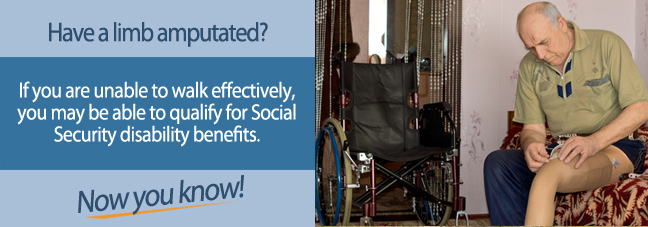According to the Amputee Coalition of America, there are around 200,000 new amputees each year in the US alone. Thanks to ever-advancing medical procedures, the majority of amputees are able to continue living their normal lives despite their condition. However, for those that cannot, Social Security disability benefits may be able to help.
If your initial application was denied, do not worry — continue below to learn what steps you can take moving forward.
Potential Causes for Amputation Denial
Disability benefits can be quite difficult to obtain. In fact, around 65% of all applicants see initial denial, which means you are far from alone in your situation. For amputations specifically, the following are the most like reasons you did not see approval:

- Your amputation is not listed or does not prevent you from living/working normally. When the Social Security Administration evaluates an application, they are looking for disorders that qualify a person as “totally and permanently disabled” according to the Blue Book. Certain amputations, such as double hand amputations or hip disarticulations, automatically qualify for benefits. However, other amputations, like single arm amputations or foot amputations, may not immediately qualify. In these cases, qualification is determined by your ability to “ambulate effectively” (walking, standing, basic travel ability, etc.) Those who show an inability to ambulate are deemed too disabled to work normally, increasing the chance of qualifying for benefits.
- You have not attempted the use of prosthetics. Prosthetic technology nowadays is incredible, allowing even quadruple amputees to see a quality of life that was previously impossible. If you have not attempted the use of prosthetics before applying, Social Security may deny your claim. However, some amputees find difficulty living their normal lives even with prosthetics. Some people even have amputations that don’t allow of prosthetic use at all due to various complications. If either of these cases is true for you, then you may be much more likely to receive benefits after an amputation.
Preparing for Your Hearing
The best thing you can do after an initial denial is set to working towards benefits again right away. The first order of business should be to schedule your disability hearing. Hearings are available to those who were initially denied and wish to present their case in court in front of an administrative law judge, or ALJ.
After reviewing your initial application and reviewing your case, an ALJ can potentially reverse your denial and award you benefits. Hearings should be scheduled in-person by visiting your nearest Office of Disability Adjudication and Review (ODAR) which can be located online.
Because the waiting period for most hearings is quite long, you can spend this time preparing your case. Review your initial application and compare it to the Social Security Blue Book to further understand why you may have been denied. Speak with your physician to determine what tests may be available to further exemplify your condition. Speak with any former bosses or coworkers to get testimonies on why your amputation prevents you from returning to your normal work. In general, the more evidence you provide, the better chance you have at receiving benefits.
Considering a Disability Attorney
Disability attorneys are statistically shown to improve applicants’ chances at receiving benefits. Their legal training helps them to build a case specifically designed to get you the benefits you deserve. Their knowledge of the medical and financial requirements can help you to organize paperwork and reduce the stress of planning. And, even better, federal law requires them to only receive payment for their services if they win your case, which further reduces your financial risk.
Consider a free consultation with a disability attorney in your area to help you prepare for your disability hearing.